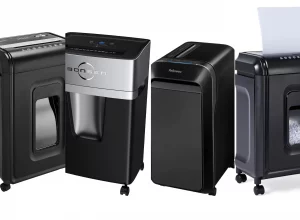Contents
Why Paper Shredders Are Essential for Data Privacy and Compliance
In an era where information is considered one of the most valuable assets for individuals and organizations alike, maintaining data privacy and compliance with regulatory standards has become critical. As businesses gather and process more sensitive information, the stakes for mishandling such data increase significantly. One fundamental tool in safeguarding this information is the paper shredder. This article delves into the reasons why paper shredders are essential for ensuring data privacy and compliance.
The Importance of Data Privacy
Data privacy concerns the proper handling of sensitive data, ensuring it is collected, stored, and disposed of securely. With the rise of data breaches and identity theft, the need for robust measures to protect private information has become paramount. Reported cases of data theft often highlight the insecure disposal of documents as a vulnerability. Shredding paper documents plays a vital role in mitigating these risks.
Regulatory Compliance Requirements
Numerous laws and regulations are designed to protect consumer data, such as the General Data Protection Regulation (GDPR) in Europe, the Health Insurance Portability and Accountability Act (HIPAA) in the U.S., and the California Consumer Privacy Act (CCPA). Many of these regulations mandate that organizations take specific steps to protect personal information from unauthorized access and breaches. Failure to comply with these legal requirements can lead to severe penalties, reputational damage, and loss of customer trust.
Benefits of Using Paper Shredders
The use of paper shredders in offices is a proactive approach toward data protection and compliance. Here are some benefits:
- Prevention of Identity Theft: By shredding documents that contain personal or sensitive information, the risk of identity theft is significantly reduced. For example, disposing of bank statements without shredding them could allow anyone to access personal banking information.
- Controlled Information Disposal: A paper shredder provides a systematic way of disposing sensitive documents rather than simply throwing them in the trash or recycling bin, where they can be retrieved and misused.
- Promotion of Compliance: Utilizing shredders helps businesses adhere to legal requirements by ensuring proper disposal procedures are followed, thus demonstrating a commitment to data privacy.
Choosing the Right Paper Shredder
Selecting an appropriate paper shredder is critical to effectively achieving data privacy and compliance goals. Here are key factors to consider:
| Feature | Description |
|---|---|
| Shredder Type | Choose between strip-cut, cross-cut, or micro-cut shredders. Cross-cut and micro-cut shredders provide enhanced security by cutting paper into smaller pieces. |
| Sheet Capacity | Consider the number of sheets your shredder can handle at once. Higher capacities will improve efficiency for larger offices. |
| Run Time | Evaluate how long the shredder can run before cooling down. Continuous operation is essential for high-volume usage. |
| Security Level | Identify shredders with appropriate security ratings (P-2 to P-7) based on the sensitivity of the information being shredded. |
Establishing a Shredding Policy
To maximize the benefits of paper shredders, organizations should establish a shredding policy that outlines guidelines for the handling and disposal of sensitive documents. Consider the following components:
- Document Identification: Train employees to recognize which documents must be shredded. This could include financial records, employee files, and confidential client information.
- Designate Shredding Areas: Create designated areas in the workplace for shredding. Having easy access encourages compliance.
- Regular Shredding Schedule: Set a regular schedule for shredding documents to prevent pile-up and ensure timely disposal.
Conclusion
In conclusion, paper shredders are indispensable tools for ensuring data privacy and compliance in today’s information-centric landscape. They prevent identity theft, facilitate controlled disposal, and help businesses meet regulatory requirements. By choosing the right shredder and establishing comprehensive shredding policies, organizations can significantly enhance their security posture and protect sensitive information effectively.




